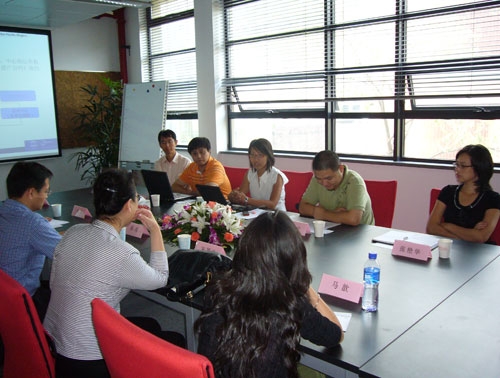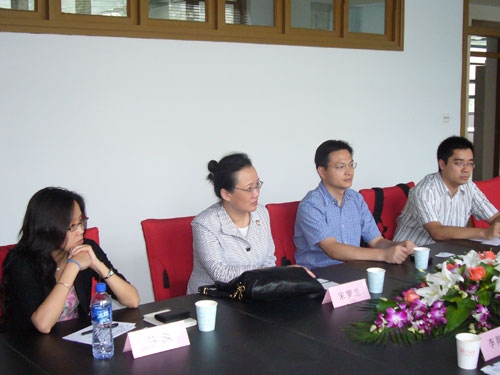| Officials from Microsoft Research Asia pay a visit to WHITR-AP (Shanghai) |
| PublishDate:2008-09-03 Hits:3156 |
Talking between WHITR-AP(Shanghai) and Microsoft Research Asia
Representatives from Microsoft Research Asia
On Sep 1st 2008, Ms. Song Luolan, Vice Director of Microsoft Research Asia (MRA), paid a visit to WHITR-AP (Shanghai). Microsoft Research Asia is largest basic research facility of Microsoft out of America, and its innovation in the basic computer science and technological breakthrough has won it fame among worldwide academia and industries. It is also dedicated to enhancing heritage conservation, education and other commonweal businesses. A significant project, in collaboration with WHITR-AP (Suzhou), has been started by Microsoft Research Asia in the development of the E-Heritage. This visit aims to pursue a mutual understanding with WHITR-AP (Shanghai) and possibility of cooperation of interdisciplinary research in the field of culture heritage conservation.
During the visit, Prof. Li Xiangning, Assistant Dean, College of Architecture and Urban Planning (CAUP), Tongji University gave a brief introduction on CAUP. Dr. Kong Ping, Unit Director of WHITR-AP (Shanghai) introduced the development of WHITR-AP, and Mr. Zang Wei, Director of the State Key Lab of CAUP, Tongji University, presented the latest application of computer technology and database in the field of urban planning and architecture. Ms. Song summed up the research areas as well as related projects of Microsoft Research Asia, and emphasized the complementary resources and potential cooperation between MRA and WHITR-AP. A preliminary discussion on possible research topics were carried out with great ardent and success. World heritage conservation is the common responsibility of the society, which requires multi-disciplinary cooperation and communications. WHITR-AP sincerely welcomes various cooperation with professionals and institutes to work together for a better conservation and management of heritage sites. |
- Call for Application | 2024 Global Awards for World Heritage Education Innovative Cases(AWHEIC) Promoting what people do and how they do it
- Documentary: 2023 World Heritage Creative X Innovators Conference and the AWHEIC Third Anniversary Celebration
- Publication | WHITRAP Newsletter No. 61
- Mt. Huangshan first show in Climate Action for World Heritage
- Call for Good Practices: 2024 Environment and Resilience
- FAQs | 2024 Call for Good Practices
Copyright © 2009-2012 World Heritage Institute of Training and Research-Asia and Pacific (shanghai)




